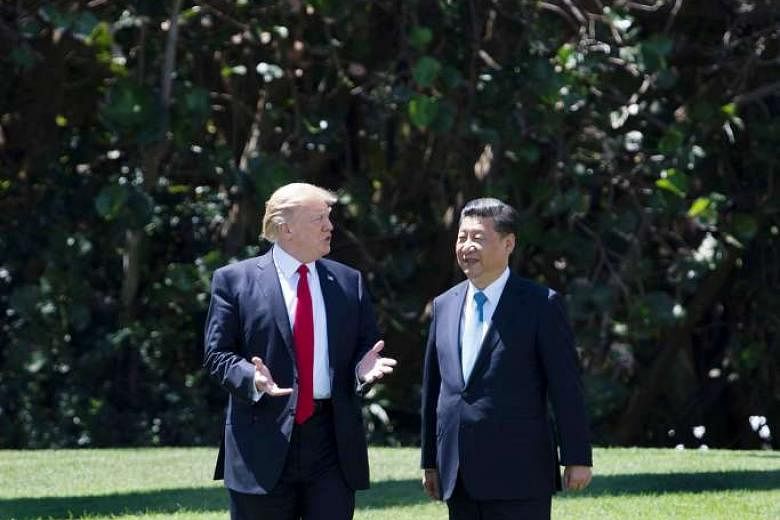Japan and US must pursue mutual benefits
The Yomiuri Shimbun
A perspective of mutual benefit is called for in formulating a new Japan-United States economic framework.
During the first meeting of the Japan-US Economic Dialogue in Tokyo on Tuesday, Deputy Prime Minister Taro Aso and US Vice-President Mike Pence agreed to set three pillars of discussions: trade and investment rules; macroeconomic and structural policies; and sector-by-sector cooperation.
Taking into account the US withdrawal from the Trans-Pacific Partnership (TPP) free trade agreement, Mr Aso put forth an idea of promoting free and fair trade rules in the Asia-Pacific region, with the initiative taken by Japan and the US. His statement was likely aimed at preventing the dialogue from leading to bilateral negotiations, in which Japan will be forced to open its markets wider than was agreed under the TPP.
With the free trade pact in mind, Mr Pence clarified the US' stance of shifting to focusing on bilateral talks to pursue their interests.
What counts is that the two countries will transcend the differences in their expectations and hold constructive debates in talks over the three pillars that will go into full swing in the future.
Japan-US trade has undergone a transformation from an era in which US deficits were conspicuous. Without pointlessly emphasising trade imbalances, the two countries must find solutions that will end up being beneficial to both sides.

Ahead of the economic dialogue meeting, Mr Pence met Prime Minister Shinzo Abe, and they confirmed that the two countries will apply stronger pressure on North Korea, which has been pushing ahead with nuclear and missile development. They also agreed to call on China to play a role in resolving the issue.
Infrastructure: Will it be Xi's real gift to Trump?
Wang Huiyao
China Daily
The recent meeting between Chinese President Xi Jinping and his United States counterpart Donald Trump in Florida concluded with both sides saying it put bilateral ties back on track.
Xinhua News Agency said that during the meeting, Mr Xi urged the two countries to push forward negotiations on the bilateral investment treaty, promote healthy bilateral trade and investment, and explore and develop pragmatic cooperation in infrastructure and energy fields.
So, will infrastructure investment be Mr Xi's real gift to Mr Trump at their next meeting?
First, Chinese investment in US infrastructure will help Mr Trump to boost the US economy.
Whether the US Congress will pass the enabling Bill is a question that no one can answer at this time. However, a prolonged political impasse is likely to stunt the desired effects of a timely growth spurt in the economy driven by the massive spending. Mr Trump has promised his supporters to double the growth rates in a relatively short period of time.
Second, an infrastructure boom in the US will provide business opportunities for Chinese as well as US firms in the construction sector.
Third, infrastructure as an asset class is gaining popularity among institutional investors. Infrastructure projects are backed by governments and yield stable cash flows with a longer time horizon, and investors across the globe are keen to help finance them.
And fourth, although the US is a relative newcomer to public- private partnership (PPP), recent trends indicate that PPPs are gaining traction in the country. And given the surging populations in US metropolitan areas and the enormous infrastructure needs, the country's PPP market is expected to grow further in the coming years.
Nearing 100 days in office, Mr Trump needs something to increase his approval ratings. His ambitious infrastructure plan is far from fully articulated. Mr Trump needs allies and, perhaps, Mr Xi can explain to him that China could be the one when they meet the next time.
Taipei headache over US-China 'friendliness'
Editorial
The China Post, Taiwan
The United States seemed set for isolationism when President Donald Trump took office in January, with the world on its toes, guessing to what extent his campaign promises would materialise.
But over the past week or so, Mr Trump has shown an aggressiveness in flexing US military muscle in some of the most serious conflict zones in the world.
It is uncertain whether the US will take concrete military action against North Korea, but Mr Trump's actions to date are far from the isolationism he had promised on his campaign trail.
It may all be a game that Mr Trump is playing, but he is apparently trying to engage China in a new strategic plan in the area, forcing Beijing to rethink its role in helping rein in North Korea.
It is very unlikely that Washington and Beijing will ever become as close as the relationships are between the US and its Nato allies. And it remains to be seen how China would react to open conflict between the US and North Korea.
But "friendliness" in any form between the two superpowers would certainly cripple Taipei's ties with Washington.
Washington may still be bound by the Taiwan Relations Act, which obliges the US to sell defensive weapons to Taiwan. But Mr Trump, as his recent change of mind has shown, may not be nearly as friendly as some assumed he would be towards Taiwan.
He broke decades-old diplomatic protocol by talking on the phone to President Tsai Ing-wen before his inauguration. But that geniality can change, just as his vows of isolationism have changed.
•The View From Asia is a weekly compilation of articles from The Straits Times' media partner Asia News Network, a grouping of 22 news media entities. For more, see www.asianews.network

